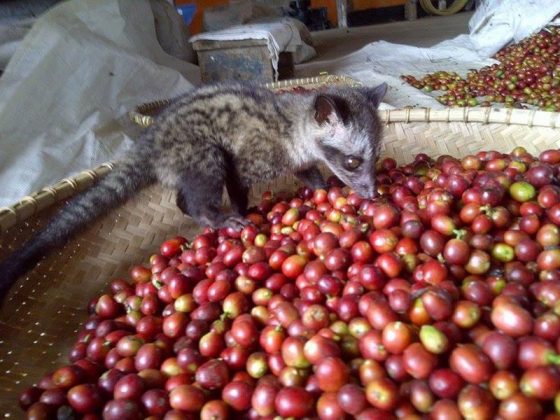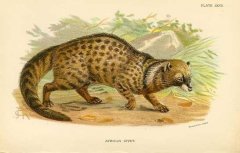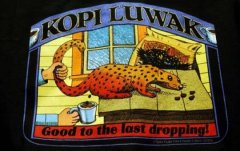The taste of Vietnamese civet coffee what is the difference between Indonesian Kopi Luwak and Vietnamese civet coffee

Professional coffee knowledge exchange more coffee bean information please follow the coffee workshop (Wechat official account cafe_style)
Objective introduction of mixed Kopi Luwak introduction of Kopi Luwak in Yunnan, China
"which would you like to eat, curry or poop-flavored curry?"
That's a question asked by a kid. It's really boring. But even if you feel bored, you can't help thinking seriously: even if the curry-flavored stool is delicious, it is still poop, while the stool-flavored curry is real curry. Which one is the right choice?
This is a philosophical question that makes people think about the essence. Even if I become an adult now, I still can't answer.
What about poop coffee? The undigested stuff in the stool is more disgusting than the stool itself, but there is a kind of coffee that is taken out of the stool and baked for people to drink.
That is the Muscat Coffee in Indonesia.
Civet coffee is a coveted treasure of many coffee lovers.
Literally speaking, poop coffee should give people the impression that it is unclean and smelly, but this kind of coffee is a high-end product that ordinary people are not able to buy. Why advanced? Because it tastes good, of course. As long as you take a sip, the mellow flavor will rush straight from the nasal cavity to the brain, leaving a lingering aftertaste like the sound of a bell. The round but full-bodied flavor, fragrant aroma and refreshing throat rhyme are just like jade syrup. It is not skilled baristas but animals that make this high-end coffee. Malay civets, which live in almost every forest in Asia, are the coffee experts who make this dreamy coffee "Kopi Luwak".
Musk cats are omnivores. Although they also eat insects, lizards, snails and other small animals, but the main food is mango, banana, figs and other fruits. Civet cats also eat coffee fruits. Although coffee fruits are digested like other fruits, the seeds (that is, coffee beans) remain in their original state. Undigested coffee beans, dried and roasted, are civet coffee. This is real poop coffee.
The civet has an excellent sense of smell and can choose well-cooked coffee beans to eat and bite off the skin. That's the point. The flavors of coffee beans and fruits are mixed in the civets and naturally fermented by intestinal bacteria in an ideal state at a certain body temperature. The bitter protein components of coffee beans are broken down by digestive enzymes and mixed with various enzymes.
This complex and wonderful chemical reaction gives coffee beans an indescribable flavor. Originally it was just a simple stool, but it turned out to be a miraculous reversal and became the most advanced organic coffee. Hearing this, some people may have a crooked idea and want to say: I might as well swallow the coffee beans and take the beans out of the stool to sell them, and I can make a lot of money. This is the real O'Lei coffee. Kind of.
However, the only thing that can give coffee beans a special effect is the intestines of civets. If humans had done such a thing, they would probably have been sent to a large hospital. Only the poop of animals like cats and raccoons can be on the highest menu and become the noblest coffee brand.
The way the coffee has just been "lined up" by the civet.
But when it comes to this, it makes people wonder: how could Indonesians think of digging coffee beans out of animal droppings for roasting? To illustrate this point, this book must be suddenly transformed into a history textbook and begin to explain Indonesian history enthusiastically.
The time background is the era when Britain, France, Portugal and other European powers swaggered in the 16th century. The Netherlands, which originally had only a small fishing village and finally had a national structure after rectifying the harbor, also followed the precedent of the eldest brother of the great powers and decided to enter the world. Its destination is Southeast Asia. The Netherlands arrived in the Asian archipelago today called Indonesia to set up the "Dutch East India Company". Although it is a company, it actually holds the power to sign a contract and start a war, which is equivalent to the organs stationed abroad by the government.
Dutch East India Company is the first joint-stock company in the world, and it is also a black-hearted enterprise. They cleverly deceived Indonesian farmers who were "more docile than sheep" and even forced them to submit by force, squeezing their labor with ultra-low wages. The East India Company took the fields of Indonesians and asked them to grow crops of high economic value, that is, spices. Spices are important materials to preserve food, can remove the smell of meat, but also can hide body odor, at that time in Europe is an indispensable item, but also to ensure the best-selling goods.
The Dutch East India Company (VOC) is a franchise company set up by the Netherlands to develop into Asia. In the past 200 years, it has sent 1772 ships overseas, with about 1 million people going to Indonesia and Taiwan. Wait for the place. Figure / wikipedia
The Dutch sell exclusive spices such as cloves and nutmeg that can only be harvested in Indonesia. The Netherlands accumulates wealth through gold earned by spice plants, while the Indonesian archipelago in the Pacific Ocean is called "the necklace of the Queen of the Netherlands".
As the saying goes, "God created the world, and the Dutch created Holland." 1/4 of the Dutch territory is below zero meters above sea level, and wetlands and silt beaches must be developed to increase the territory with extraordinary efforts. This pioneering spirit is admirable. However, after they entered Asia with a great pioneering spirit, they somehow became cold-blooded people who did not regard people as human beings. The Netherlands unilaterally assigns farmers to plant cash crops and then buys them all at low prices. Even the small amount of income left by farmers is taxed. This pressing method is almost like trying to squeeze water droplets out of a dry rag.
One of the most notorious is the "compulsory cultivation Law", which promotes large-scale cultivation of agriculture. By contrast, even the Tokugawa shogunate's means of "treating people neither live nor die" is like a generous social welfare policy. Japan has even recorded that Dutch people in and out of Nagasaki especially strictly inspect their holdings because of their enslavement and recalcitrant attitude.
Hey, Dutch! You teach the so-called orchid study in a noble manner in Japan, but why do you do such an excessive thing in Indonesia? How dare you turn the windmill as if nothing had happened! I'm going to pull out all the tulips!
Tulips are the representative flowers of lowland countries.
Because of excessive anger, I wrote something that I didn't know what to say. But at that time, almost all European countries were doing this kind of activity. If you think about it this way, today's so-called advanced countries feel like criminal syndicates that have reformed into legitimate industries only after they have made money by fraud.
When the spice trade deteriorated, the Dutch asked farmers to plant a more profitable tree: coffee. Coffee has been widely spread in Europe since the 17th century. This precious drink entered Europe through the Mediterranean trade, immediately became popular all over Europe, and became a common drink in the twinkling of an eye. The coffee trade was originally monopolized by Islamic businessmen. This is because coffee beans must pass through Islamic countries when they enter Europe from the Arabian Peninsula. The Dutch decided to intervene in the exclusive cause of Islam. They grow coffee in Indonesia and sell it themselves. Their plan achieved the expected success.
However, the Dutch are not so happy and generous as to invite farmers to drink coffee. On the contrary, they don't even give a bean to the farmers. However, farmers also want to see what coffee tastes like. They want to know how delicious the beans are that make white bosses so crazy. But they are strictly forbidden to taste crops and will be severely punished if they break the rules. Farmers can only hide out of sight of the Dutch and pick up coffee beans from the feces of civet cats. They must feel very miserable that they can only turn over the animal droppings and can't get any harvest from the hard and sweaty farming.
But a miracle happened. The coffee beans extracted from the droppings of this wild animal have a taste and aroma much higher than that of ordinary coffee. It was not the Dutch who tasted the delicacy at first, but the farmers who had no status. But then the news reached the ears of the Dutch, and even the coffee extracted from animal dung became a target. The fields that were converted to cash crops could not harvest food, and soon the famine came, causing many farmers to starve to death. Such stories seem to hear the music of black soul songs. After understanding this period of history, civet coffee also tastes of tears.
However, human beings cannot overcome the temptation of delicacy. Even knowing this painful and sad history, there are still people who are willing to spend a lot of money for delicious coffee.
There is no limit to human desires. Suppose a cosmetic method is established: "as long as you jump into the urinal, you can definitely be ten years younger." There's got to be a woman who's willing to pay 1 million to jump in. If there is demand, there will be people who want to sell and make money. This is the law of capitalism.
In order to meet people's demand for civet coffee, some people even raise civets specially. Photo / Central News Agency
Then again, civet coffee is rare and therefore more valuable. Wild civets, which are already rare, choose ripe coffee fruits to eat, and then let coffee beans ferment to an ideal state in a stress-free state of health. Only when these conditions are met can we get the dreamy civet coffee.
However, at present, it is said that civet coffee is produced in large quantities in Indonesia. Civet cats are kept in captivity like chickens on a chicken farm, forcibly feeding coffee beans and taking feces.
The civet was kept in a narrow cage and could not escape even if it became mad and ill due to stress. It had to eat coffee fruit until it died.
Although the civets produced like this have not been officially recognized, many of them are actually in circulation on the market.
This structure seems to bear some resemblance to the relationship between the Dutch and Indonesian farmers in the past.
History repeats itself. While chewing this sentence, sipping civet coffee.
At this time, it is reasonable to say that the bitter ingredients of coffee beans have been decomposed by enzymes, and they will still feel a special slightly bitter taste.
Stool, feces, poop. No matter how elegant the name is, all we can think of is the smelly thing that fell from the mouth of the hole. The nervous system and immune function of organisms are so sophisticated, why is only the excretion process so hasty? Poop, who are you?
Animal poop is very useful!
The author of this book, Hayakawa, is a well-known "strange creature" research master in Japan. he will show you about the poop of different animals and how these animals produce amazing animal behavior. "Don't think about poop", published by the owl.
.
Important Notice :
前街咖啡 FrontStreet Coffee has moved to new addredd:
FrontStreet Coffee Address: 315,Donghua East Road,GuangZhou
Tel:020 38364473
- Prev

What does the EK43+ cherry blossom coffee machine feel like to make a cup of the world's most expensive civet coffee?
Professional coffee knowledge exchange more coffee bean information please follow the coffee workshop (Wechat official account cafe_style) objective introduction of the mixed Kopi Luwak China Yunnan Kopi Luwak introduction how to create the world's most expensive ground coffee? In addition to the coffee beans to be expensive and top-notch, in fact, the machine is also very important. Starting from the bean grinder, the general electric bean grinder is better than cutting with a knife.
- Next

Civet Coffee-should not drink coffee Indonesian civet coffee production process exposure how to drink?
Professional coffee knowledge exchange more coffee bean information please pay attention to the coffee workshop (Wechat official account cafe_style) objective introduction of Kopi Luwak Yunnan Kopi Luwak of China introduced civet coffee (cat dung beans, Kopi Luwak) have not drunk, also do not intend to drink, so whether it is good or not really do not know, but this kind of beans, which is contrary to my aesthetics, I absolutely do not drink.
Related
- Detailed explanation of Jadeite planting Land in Panamanian Jadeite Manor introduction to the grading system of Jadeite competitive bidding, Red bid, Green bid and Rose Summer
- Story of Coffee planting in Brenka region of Costa Rica Stonehenge Manor anaerobic heavy honey treatment of flavor mouth
- What's on the barrel of Blue Mountain Coffee beans?
- Can American coffee also pull flowers? How to use hot American style to pull out a good-looking pattern?
- Can you make a cold extract with coffee beans? What is the right proportion for cold-extracted coffee formula?
- Indonesian PWN Gold Mandrine Coffee Origin Features Flavor How to Chong? Mandolin coffee is American.
- A brief introduction to the flavor characteristics of Brazilian yellow bourbon coffee beans
- What is the effect of different water quality on the flavor of cold-extracted coffee? What kind of water is best for brewing coffee?
- Why do you think of Rose Summer whenever you mention Panamanian coffee?
- Introduction to the characteristics of authentic blue mountain coffee bean producing areas? What is the CIB Coffee Authority in Jamaica?

